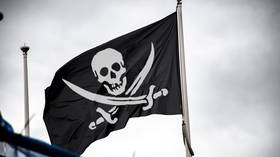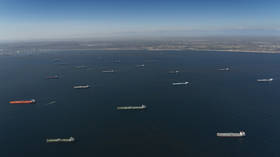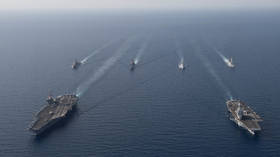Oil pirates have a new favorite hotspot

Gone are the days when Somalia's Gulf of Aden was considered the most dangerous piracy zone for oil companies and other seafarers.
But now, with offshore oil storage bursting at the seams as a result of a disastrously timed oil price war and the demand-decimating effects of COVID-19, the pirate's treasure trove is shifting.
The Gulf of Guinea, a key oil production hub adjoining no less than eight oil-exporting countries off the western African coast, is now officially the world's deadliest piracy hotspot.
According to the International Maritime Bureau (IMB), the first quarter of 2020 witnessed a spike in maritime piracy across the globe, with 21 of the world's total of 47 attacks recorded in the Gulf of Guinea compared to the global total of 38 for last year's corresponding period. Seventeen crew members were kidnapped in the attacks, with the northeastern most part of the tropical Atlantic Ocean continuing to live up to its deadly billing.
Last year, the Gulf of Guinea was responsible for 121 kidnappings, good for 90% of the world's total kidnappings at sea.
Also on rt.com Why pirates are giving up on oilEconomic Damages
The majority of the incidents occurred in Nigerian territorial waters, especially around the Niger Delta, but to a lesser extent, also in the shipping hub of the Port of Lagos.
Unfortunately, this trend is expected to continue well into 2021.
In a research note, Alexandre Raymakers, senior Africa analyst at Verisk Maplecroft, says a lack of adequate equipment and personnel leaves local security forces unable to deal with the menace effectively.
Verisk cites frustration with the inequitable distribution of the region's vast oil and gas riches, a relatively well-trained militia that has honed its skills fighting in the Delta's secessionist movement, and regular ransom payments as key reasons why the Gulf of Guinea continues to be a rich hunting ground for pirates.
Verisk warns that international oil companies (IOCs) like ExxonMobil, Chevron, Shell, Eni and Total with operations out of Nigeria, Gabon and Equatorial Guinea are particularly at high risk of experiencing disruptive instances of piracy in their West African supply chains.
This comes at a dismally bad time for offshore drillers, with the likes of Shelf Drilling, Valaris, Maersk Drilling, and Borr Drilling set to lose up to $3 billion in lost contracts in the current year due the Covid-19/OPEC/OPEC+ situation.
The economic damages for oil companies and governments from piracy can be devastating.
Three years ago, it was estimated that the Nigerian government was losing 400,000 barrels of crude daily to pirates in the Gulf of Guinea worth some $1.5 billion a month. That worked out to nearly five percent of the country's GDP.
But it doesn't pay nearly as much to steal oil these days, and even pirates are on the losing end of the oil price culling.
With oil prices so low, Verisk says pirates are likely to change tact and resort to abducting crews for ransom.
What the world has learned about pirates since the days when Somali was a key hub is that they are incredibly adaptable to changing times - much more so than the industry or global security forces are.
Reduced Piracy Overall
The world has generally been seeing reduced activity in piracy hotspots of yesteryears, including Somalia, Malaysia, Indonesia, Singapore, Vietnam, and Bangladesh.
For nearly a decade, the Greater Gulf of Aden took the crown as the most dangerous of them all. But remarkably, piracy in Somalia has been virtually stamped out, with only a single failed attempt recorded last year, a far cry from the more than 200 attacks every year during its peak. In fact, no successful hijackings of cargo ships have been recorded in about seven years.
Armed with little more than skiffs, Kalashnikovs, and ladders, khat-chewing villains from Somalia terrorized the region's seas for years, hijacking cargo ships and extracting millions of dollars in ransom. They even managed to capture Hollywood's imagination in the 2013 hit film Captain Phillips. Defeating Somalia's piracy scourge required unprecedented cooperation by navies from different nations as well as concerted efforts to boost stability ashore.
But most importantly, it took a radical break with traditional shipping practices by deploying armed guards on commercial vessels to deter pirates from attacking.
The same strategy seems to be paying off elsewhere, with the IMB reporting that strategic deployment of marine police patrol vessels has mainly been responsible for the continued decline in piracy incidents in most Indonesian waterways and anchorages.
So now, it's time for yet another adaptation by the oil industry in order to avoid costly disruptions that it can't afford right now. That might mean that a military presence on cargo ships could end up being a must-have for the Gulf of Guinea and other hotspots.
By Alex Kimani for Oilprice.com
















